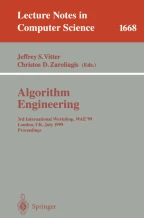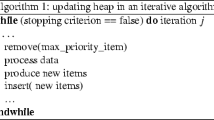Abstract
A transformation, referred to as depletion, is defined for comparison-based data structures that implement priority queue operations. The depletion transform yields a representation of the data structure as a forest of heap-ordered trees. Under certain circumstances this transform can result in a useful alternative to the original data structure. As an application, we introduce a new variation of skew-heaps that effficiently implements decrease-key operations. Additionally, we construct a new version of the pairing heap data structure that experimentally exhibits improved efficiency.
Preview
Unable to display preview. Download preview PDF.
Similar content being viewed by others
References
M. L. Fredman, On the efficiency of pairing heaps and related data structures, to appear in Journal of the ACM.
M. L. Fredman, R. Sedgewick, D. D. Sleator, and R. E. Tarjan, The pairing heap: a new form of self-adjusting heap, Algorithmica 1,1 (1986), pp. 111–129.
M. L. Fredman and R. E. Tarjan, Fibonacci heaps and their uses in improved network optimization problems, Journal of the ACM 34,3 (1987), pp. 596–615.
D. W. Jones, An empirical comparison of priority-queue and event-set implementations, Communications of the ACM 29, 4 (1986), pp. 300–311.
D. D. Sleator and R. E. Tarjan, Self-adjusting heaps. SIAM Journal on Computing 15,1 (1986), pp. 52–69.
J. T. Stasko and J. S. Vitter, Pairing heaps: experiments and analysis, Communications of the ACM 30,3 (1987), pp. 234–249.
J. Vuillemin, A data structure for manipulating priority queues, Communications of the ACM 21 (1978) pp. 309–214.
Author information
Authors and Affiliations
Editor information
Editors and Affiliations
Rights and permissions
Copyright information
© 1999 Springer-Verlag Berlin Heidelberg
About this paper
Cite this paper
Fredman, M.L. (1999). A Priority Queue Transform. In: Vitter, J.S., Zaroliagis, C.D. (eds) Algorithm Engineering. WAE 1999. Lecture Notes in Computer Science, vol 1668. Springer, Berlin, Heidelberg. https://doi.org/10.1007/3-540-48318-7_20
Download citation
DOI: https://doi.org/10.1007/3-540-48318-7_20
Published:
Publisher Name: Springer, Berlin, Heidelberg
Print ISBN: 978-3-540-66427-7
Online ISBN: 978-3-540-48318-2
eBook Packages: Springer Book Archive




